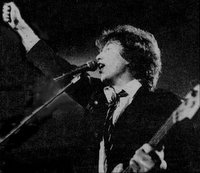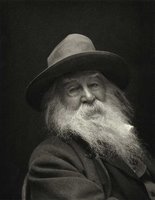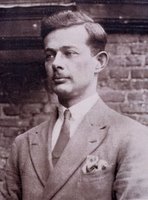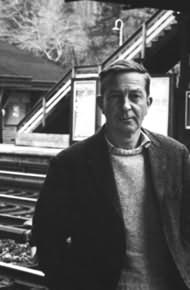 Patrick White
Patrick White born 28 May 1912 (d. 1990)
Patrick Victor Martindale White was an Australian author widely regarded as one of the major English-language novelists of the 20th century. From 1935 until his death, he published 12 novels, two short story collections and eight plays. His fiction freely employs shifting narrative vantage points and a stream of consciousness technique. In 1973, he was awarded the Nobel Prize for Literature.
White was born in London to Australian parents, who settled in Sydney when he was six months old. As a child, he, with his sister, nanny, and maid, lived in one flat, while his parents lived in an adjoining flat. White remained distant from his parents throughout his life. At the age of four, White developed asthma and his health was fragile throughout his childhood, which, while it precluded his participation in many childhood activities, stimulated his imagination. He would perform private rites in the garden, and would dance for his mother’s friends. He loved the theatre, which he first visited at an early age.
At the age of ten, White was sent to Tudor House School, a boarding school in the New South Wales highlands, in an attempt to abate his asthma. It took him some time to adjust to the presence of other children. At boarding school he started to write plays. Even at this early age, White wrote about noticeably adult themes. In 1924, the boarding school ran into financial trouble, and the headmaster suggested that White be sent to boarding school in England, a suggestion which his parents accepted.
White struggled to adjust to his new surroundings at this new school, Cheltenham College. He was later to describe it as 'a four-year prison sentence'. White withdrew inside himself and had a limited circle of acquaintance. Occasionally he would holiday with his parents at European locations, but their relationship still remained distant. While in London, White did make one close friend, Ronald Waterall, an older boy who shared similar interests. White’s biographer, David Marr, wrote that the two men would walk arm in arm to London shows, stand around stage doors to catch a glimpse of their favourite stars, and give practical demonstrations of chorus girls’ high kicks, with appropriate vocal accompaniment. When Waterall left school, White again withdrew into himself. He asked his parents if he could leave school to become an actor. They compromised, allowing him to finish school early, on the condition that he first come home to Australia, to try life on the land.
White spent two years working as a stockman at a station on the edge of the Snowy Mountains in New South Wales, Australia. His parents felt that he should work on the land rather than become a writer and hoped that his work as a jackaroo would cause his artistic ambitions to fade. Although White grew to respect the land, and his health started to improve, it was clear that he was not cut out for this life.
From 1932 to 1935, White lived in England, studying French and German literature at King's College, Cambridge. He struggled in his first term, in part because he developed an attraction to a young man who had come to King's to become an Anglican priest. White dared not speak of his feelings for fear of losing the friendship and, like many homosexual men of that period, feared that his sexuality would doom him to a lonely life. Then one night, the student priest, after an awkward liaison with two women, admitted to White that women meant nothing to him sexually. This became White’s first love affair.
While at Cambridge University, a collection of White's poetry was published under the title
The Ploughman and Other Poems, and he wrote a play that was performed by an amateur group. He received his Bachelor of Arts in 1935, and briefly settled in London, where he lived in an area that was frequented by artists. Here, the young author thrived for a time, writing several unpublished works, and reworking a novel,
Happy Valley, that he had written while jackarooing. In 1937, White’s father died, leaving him ten thousand pounds. This enabled him to write full-time in relative comfort. Two more plays followed, before he succeeded in finding a publisher for
Happy Valley. The novel was received well in London, but poorly in Australia. He wrote another novel but abandoned it after receiving negative comments, which he later spoke of regretting.
Towards the end of the 1930s, White spent some time in the United States, including Cape Cod, Massachusetts and New York City, where he wrote
The Living and the Dead. By the time World War 2 broke out, he had returned to London and joined the Royal Air Force. He was accepted as an intelligence officer, and was posted to the Middle East. He served in Egypt, Palestine, and Greece before the war was over. While in the Middle East, he had an affair with a Greek Army officer, Manoly Lascaris, who was to become his life partner.
After the war, White once again returned to Australia, buying an old house in the semi-rural outskirts of Sydney. Here he settled down with Lascaris, the officer he had met during the war. They lived there for 18 years, selling flowers, vegetables, milk, and cream. During these years, he started to make a reputation for himself as a writer, publishing
The Aunt's Story and
The Tree of Man, which was published in the United States in 1955 and shortly after in England.
The Tree of Man was released to rave reviews in the US, but, in what was to become a typical pattern, was panned in Australia. White had doubts about whether to continue writing, after his books were largely dismissed in Australia (three of them having been called ‘un-Australian’ by critics), but, in the end, decided to persevere. His first breakthrough in Australia came when his next novel,
Voss, won the inaugural Miles Franklin Literary Award.
In 1961, White published
Riders in the Chariot. This was to become both a bestseller as well as a prize-winner, garnering him a second Miles Franklin Award. Soon, he had clearly established his reputation as one of the world's great authors, but remained an essentially private person, resisting opportunities for interviews and public appearances, although his circle of friends had widened significantly.

In 1968, White wrote
The Vivisector, a character portrait of an artist. Many people drew links to his friend, the painter Sidney Nolan, but White always vehemently denied any connection. Around this time, he decided that he would not accept any more prizes for his work, and declined both the $10,000 Britannia Award and another Miles Franklin Award. White was approached by Harry M. Miller to work on a screenplay for Voss, but nothing came of it. He became an active opponent of literary censorship and joined a number of other public figures in signing a statement of defiance against Australia’s decision to participate in the Vietnam War.
In 1973, White became the first Australian to receive the Nobel Prize for Literature, 'for an epic and psychological narrative art, which has introduced a new continent into literature'. White enlisted Sidney Nolan to travel to Stockholm to accept the prize on his behalf. The award had an immediate impact on his career, as his publisher doubled the print run for
The Eye of the Storm and gave him a larger advance for his next novel. White used the money from the prize to establish a trust to fund the Patrick White Award, given annually to established creative writers who have received little public recognition. White was also made Australian of the Year, but, in typically rebellious fashion, his acceptance speech encouraged Australians to spend the day reflecting on the state of the country.

White supported Gough Whitlam's Labour government and, following the 1975 constitutional crisis, became particularly anti-royalist, making a rare appearance on national television to broadcast his views on the matter.
During the 1970s, White’s health began to deteriorate — his teeth were crumbling, his eyesight was failing, and he had chronic lung problems. In 1979, his novel T
he Twyborn Affair was short-listed for the Booker Prize, but White requested that it be removed in order to give younger writers a chance to win. Soon after, White announced that he had written his last novel, and that in the future, he would write only for radio or for the stage.
In 1981, White published his autobiography,
Flaws in the Glass: A Self-Portrait, which explored several issues about which he had publicly said little beforehand, such as his homosexuality, and his refusal to accept the Nobel Prize personally. On Palm Sunday, 1982, White addressed a crowd of 30,000 people, calling for a ban on uranium mining and for the destruction of nuclear weapons.
In 1986 White released one last novel,
Memoirs of Many in One, though it was curiously published under the pen name "Alex Xenophon Demirjan Gray" and edited by Patrick White. In the same year, his novel
Voss was turned into an opera. White refused to see it when it was first performed at the Adelaide Festival, because Queen Elizabeth II had been invited, and chose instead to see it later in Sydney. In 1987, White wrote
Three Uneasy Pieces, with his musings on ageing and society's efforts to achieve aesthetic perfection. When David Marr finished his biography of White in July 1990, his subject spent nine days going over the details with him.
 Tom Robinson born 1 June 1950
Tom Robinson born 1 June 1950








































